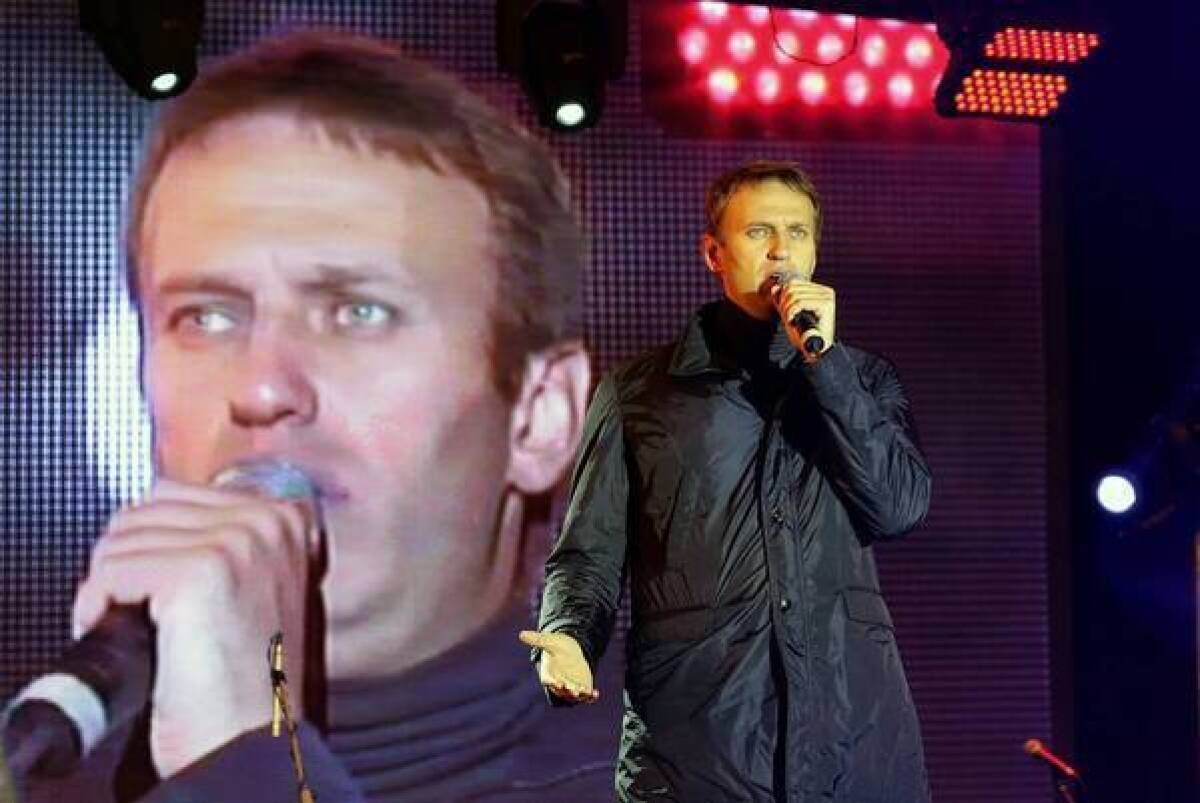In Moscow mayor’s race, a claim of victory amid questions

- Share via
MOSCOW — A Kremlin-backed candidate declared a narrow victory early Monday in the race for mayor of Moscow, apparently fending off a pack of rivals led by a leading critic of Russian President Vladimir Putin. But an independent monitoring group questioned the results.
Shortly after midnight Sunday, acting Mayor Sergei Sobyanin appeared before a crowd of several thousand supporters gathered in central Moscow and said that while the vote was close, he was confident that he had won. The Moscow Election Commission said that, with three-quarters of the votes counted, Sobyanin was leading opposition figure Alexei Navalny, 51.5% to 27.1%.
Navalny was the most prominent of five challengers.
However, the independent Alliance of Observers, which sent monitors to more than half the polling stations, said its partial results showed Sobyanin with only 49.8% of the vote. He needed just over 50% to avoid a runoff in two weeks with the second highest vote-getter.
A staunch Putin loyalist, the 55-year-old Sobyanin was appointed mayor in 2010 by then-President Dmitry Medvedev and was running Sunday in his first bid to win a full term in office.
The race drew international attention, largely because of the presence of Navalny, a popular blogger and anti-corruption crusader who is considered Putin’s most vocal critic. Navalny was convicted this summer of embezzlement charges, which he considered politically motivated, and sentenced to five years in prison. He was released on appeal after one day.
Although most exit polls showed Sobyanin winning a majority of votes, Navalny, 37, insisted Sunday that his own exit polls showed the incumbent falling short. He warned that the election could be determined by “falsifications.”
Some analysts said his strong showing may make the Kremlin hesitant to send Navalny back to prison.
“No matter what will be the final vote count, the Kremlin already suffered a shattering defeat because it no longer can allow the man for whom well over 500,000 people voted in Moscow to return to prison,” Andrei Piontkovsky, a senior researcher with the Academy of Sciences’ System Analysis Institute, said in an interview. “The main slogan of Navalny’s campaign was ‘Putin is a thief,’ and thousands of people supported that notion.”
Numerous monitoring organizations failed to register any serious electoral problems Sunday, in contrast to elections for president in 2012 and parliament in 2011, when widespread fraud was alleged.
However, critics said the campaign was lopsided, because Navalny never appeared on any of the federal or Moscow television channels while Sobyanin was featured daily.
“The Kremlin tried to experiment, holding something resembling a fair election with a key opposition candidate campaigning with a tight noose around his neck,” said Lilia Shevtsova, a senior researcher with the Carnegie Moscow Center. “The fact that so many people voted for Navalny makes him from now on a major political leader of national scale.”
Turnout Sunday was low, estimated at about 30%. Experts said many Muscovites either doubted the importance of voting or were late coming back from a weekend at their summer homes.
Viktor Tkachenko, an 81-year-old pensioner, was among those who did cast a ballot — in his case, for Navalny. He said the country badly needed change and Navalny was capable of delivering it.
“All my life, numerous hopes for change have been dashed because we never had a leader who really wanted change,” Tkachenko said. “I trust Navalny is such a leader, and helping him win the mayoral race would be just the first stage of bringing change to the rest of the country. We do deserve a better, more democratic and free life, and we have been waiting for it far too long.”
But Anna Makeyeva, a 37-year-old homemaker, said she voted for Sobyanin, whom she called “a handsome man of few words,” because of his record as mayor.
“Under Sobyanin they repaired roads in my neighborhood, built children’s playgrounds and sports centers,” Makeyeva said. “Navalny talks a lot, but we don’t need words, we need deeds, and Sobyanin delivers them quite well.”
Sobyanin, a native of northern Siberia who was trained as an engineer, has had a long career as a Soviet and, later, Russian bureaucrat and political figure. He served as Putin’s chief of staff from 2005 to 2010, when he was appointed mayor of Moscow, replacing longtime incumbent Yuri Luzhkov, a flamboyant figure once seen as a likely presidential candidate but whose clashes with the Kremlin ultimately led to his undoing.
In another election Sunday, opposition activist Yevgeny Roizman, a founder of the City Without Drugs foundation who has fought drug traffickers in the Ural Mountains region and established clinics to treat addicts, won the mayor’s race in Yekaterinburg, a regional capital in the Urals.
More to Read
Sign up for Essential California
The most important California stories and recommendations in your inbox every morning.
You may occasionally receive promotional content from the Los Angeles Times.










